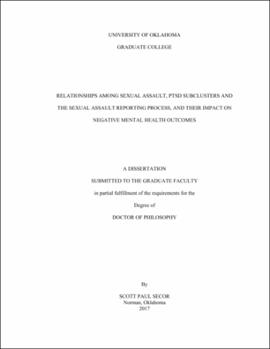| dc.description.abstract | Sexual assault is prevalent on college campuses and often impacts victims in profound ways (e.g., posttraumatic stress disorder; PTSD). Research has begun to focus on the Subclusters of PTSD—as defined by the DSM-5—in order to understand their unique contribution in sexual assault victims to either characterological self-blame or behavioral activation. Research on social cognition highlights that characterological self-blame is predictive of increased severity of PTSD symptomology due to the victim’s fear of disconnection from relationships. Due to the connection between sexual assault and social identity, reporting of sexual assault may be an integral factor in either the promotion of this characterological self-blame or a healthier behavioral activation response, particularly for college-aged victims who are transitioning into emerging adulthood. This study found that PTSD Subcluster symptom distress, specifically Subcluster B (Re-Experiencing), predicted greater negative mental health outcomes for previous sexual assault victims who experienced an assault either before attending OU, or while attending OU, when controlling for demographic variables and the other Subclusters of avoidance (Subcluster C), negativity (Subcluster D), and arousal and reactivity (Subcluster E). Further, the combined Subclusters of B and D were significant predictors of greater negative mental health outcomes for previous assault victims as compared to Subclusters C and E. For individuals having experienced an assault both before attending OU, and while attending OU, Subcluster D (Negativity) was the only significant predictor of negative mental health outcomes. The results suggest that for individuals having been previously assaulted, re-experiencing of the trauma may be the most beneficial focus of intervention regarding the promotion of positive mental health outcomes due to the lack of behavioral activation often linked with the intrusive thoughts and emotional distress associated with traumatic memories unique to this Subcluster. However, when intervening with individuals who endured multiple assaults over the early developmental lifespan, interventions geared toward shame and characterological self-blame appear crucial due to the potential for disconnection from relationships caused by increased negative affect and isolation during a developmental period in which social connection and relational experimentation is a defining feature. | en_US |
